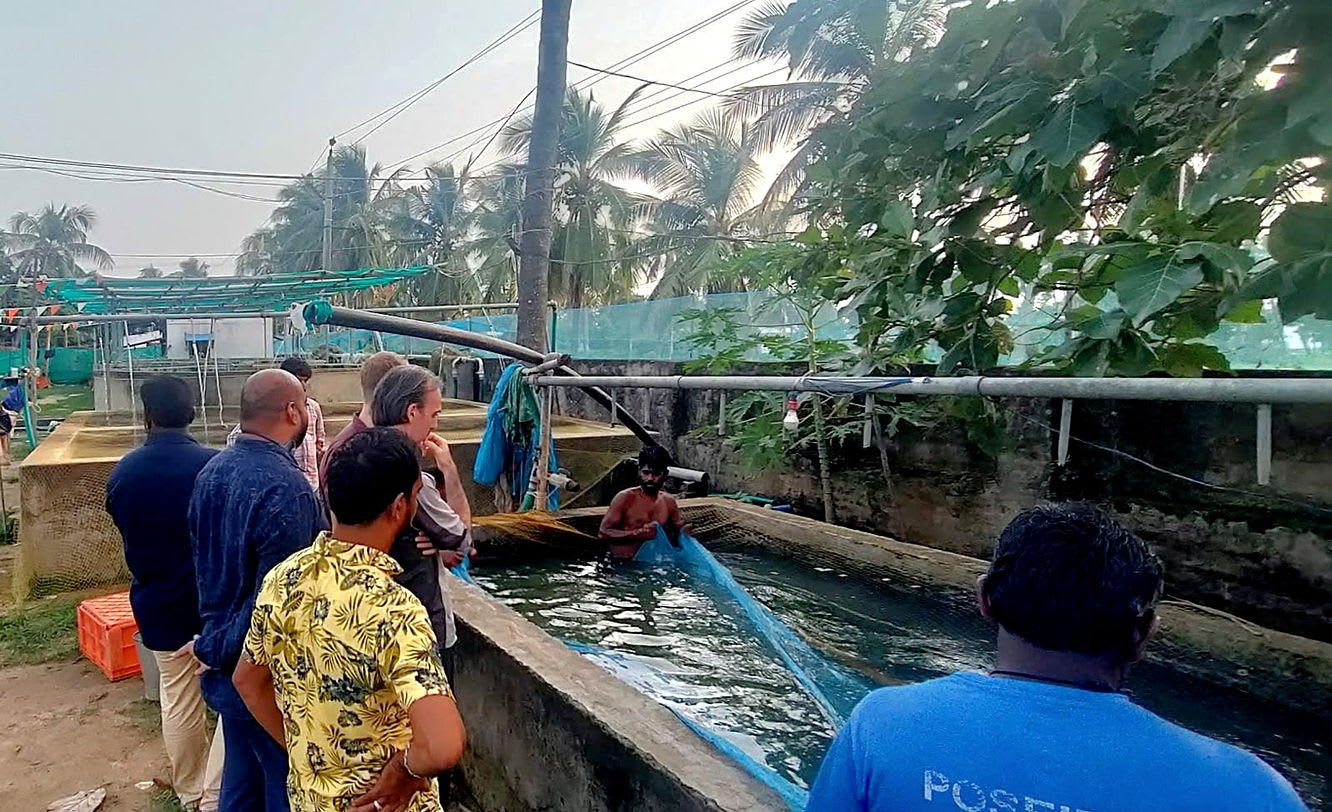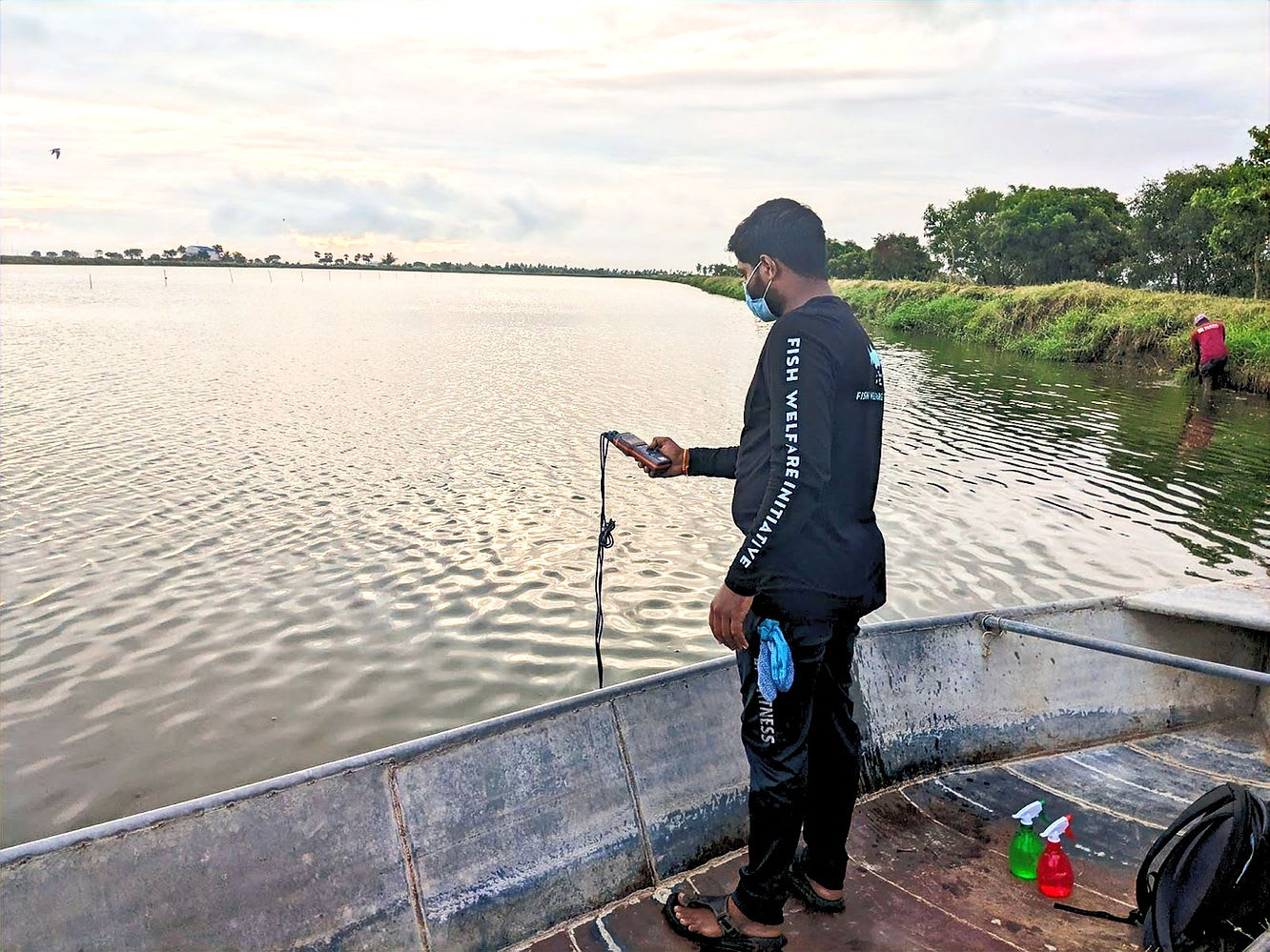Fish Welfare Initiative Strategy Update: Broadening Our Research Mandate in India
By haven @ 2023-11-28T13:37 (+38)
Note that the following is cross-posted from our blog. We're also posting it here for the dual purposes of both visibility and transparency, especially as the effective altruism community has been so integral to our work from the beginning.
Earlier this month, we gathered most of our team together in Vijayawada, India, to discuss FWI’s India plans for 2024. Those meetings resulted in the following priorities:
- Research & Development: We are planning to conduct several in-field studies to identify and test promising interventions. R&D will be a greater focus of the organization in 2024. It is also now our largest budget allocation.
- Program Implementation: We are aiming to add 100 new farms to our current farmer program in India, the Alliance For Responsible Aquaculture (ARA). However, an equally large focus for this program will be on innovating new models within it—see more below.
- Policy and Other Stakeholder Work: Although this is not our primary focus, we will continue building relationships with policymakers and other parties who may enable us to scale.
For more information on our specific goals and plans for next year, see our 2024 OKRs and budget.
The rest of the post mainly focuses on the following two strategy changes:
- We are broadening the mandate of our R&D to look into alternative programs, not just alternative welfare improvements for our current farmer program (the ARA).
- Similarly, as mentioned above, our farmer program will focus more heavily on innovating novel strategies.
This post does not include much discussion of either a) our work in China, or b) the results from our 2023 work, although we plan to publish posts on each within the next 2–3 months
Lastly, we are now also beginning to fundraise again to fill our 2024 funding gap. If you are considering donating, or for more information on the value of a donation to FWI, see our Donation Page FAQ.
As always, comments and suggestions are most welcome! We are extremely grateful to all those who, financially and otherwise, have enabled the impact we have achieved and the potential we have built thus far.
Update #1: Broadened Mandate of Our Research
Given the understudied nature of the welfare issues (e.g. with Indian major carp species) that we seek to address, FWI has always had to invest significantly in research. Over the past 2–3 years, this research has focused primarily on welfare improvements in a particular context—specifically, we sought to answer the question “Which welfare improvements are most cost effective, given that they are implemented a) at the growout (i.e. adult) life stage, and b) via a monitoring program like our current farmer program?” In other words, we aimed to determine which welfare improvements fit best in our already pre-established theory of change.
Now, we are broadening the mandate of our research to explore other theories of change, in the hopes that they could be more impactful than what we are currently running. Instead of just focusing on our current farmer program, we will be researching other promising interventions entirely.
The following are some of the implications of this change:
- Departmental name and leadership change: Our previous Welfare Standard Department, which was focused on identifying promising welfare standards (e.g., e.g.) has now been renamed the Research & Development Department. We have also hired a new departmental lead on this project, Dr. Paul Monaghan, who has previous experience in managing and designing studies for multimillion-dollar public health programs.
- Studies to be run next year: Per our OKRs, we will be running several studies of alternative programs in India over 2024. We are currently in the process of narrowing down which exact studies to run, and will publish our planned schedule on our blog in the coming two months.

Update #2: Greater Focus on Innovation in Our Farmer Program
Relatedly, our farmer program in India is investing comparatively more in innovating new strategies for welfare improvements delivery (and comparatively less in optimizing our current strategy). While our program for the past year has focused pretty consistently on stocking density caps and monthly monitoring visits to give water quality corrective actions, over the coming year we’re interested in exploring more structural changes such as the following:
- Stocking density measurement changes: One challenge that has recently arisen is the revelation that, possibly for various reasons including inaccurate acreage estimates of the farms we work with, true stocking densities may have been higher than what we understood them to be. One of our projects this quarter is to determine if there are more accurate ways of measuring densities in these contexts, and, if so, to implement them.
- Monitoring visit scheduling changes: We currently visit each farm monthly, regardless of its past history of welfare issues or other factors. We plan to investigate whether a different scheduling algorithm would detect a greater number of welfare issues.
- Measurement type changes: Recent tests have thrown into doubt the accuracy of the water quality meters we use, so we are investigating different types of measurements. For instance, we are currently exploring the Winkler Method to assess dissolved oxygen based on samples we bring to our office/lab, as opposed to using the meter at the farm.
- Farm and regional changes: We are planning to further diversify the farm demographic of our ARA by adding more farms of other life stages, such as rearing ponds and/or nurseries. We will also add farms in a new region next year.

Reason for Changes: Limitations with Our Current Model
While we previously did see limitations of our current welfare standards, we felt that the underlying model—regular visits to growout farmers to implement some kind of welfare standard with them—was sufficiently promising to scale.
Now, we’re not so sure (though we do believe our current model model has had moderate impact). Over the past few quarters, we’ve come to have significant doubts that this model of helping fish in India has sufficient long-term cost-effectiveness and scalability.
More specifically, we’ve become more concerned of the following limitations with our current model:
- Insufficient per-fish magnitude of impact: Most of the ways we currently help fish are by alleviating particularly poor instances of water quality—for instance, if our data collector measures extremely low oxygen in a farm, we advise the farmer to take immediate corrective actions to alleviate the issue. However, in most cases these corrective actions do not seem to be particularly lasting improvements throughout the animals’ lives, suggesting that our impact per-fish (for instance, our DALY-equivalent) is less than we believe we could otherwise achieve. Additionally, once-monthly visits inevitably mean that the majority of welfare issues go unnoticed by us.
- Insufficient evidence base: Related to the above issue, we currently lack a sufficient evidence base on welfare improvements for Indian major carp (our target species), and feel that we must spend more effort building this base. It’s worth noting that we’ve broadly felt this way since the inception of our organization, but we believe that the additional resources we’re allocating (40% of our budget is now R&D) and expertise we’re investing in (e.g. the hiring of Dr. Monaghan) indicate that we are now better suited to actually build this evidence base.
- Significant monitoring efforts for less payoff: Under our current model, we have to conduct a large number of monitoring visits to identify issues—for instance, one analysis we did in June found that only ~1% of our farm visits ended up in us sufficiently helping fish to count them in our impact numbers. This limits our cost-effectiveness.
- Linear scalability: Right now, as we regularly visit every farm we work with, our staff size and equipment inventory needs to scale linearly with new farms added. We’ve come to think that this is unlikely to be cost effective at larger scales.
- Unclear sustainability: We would ideally like to change the aquaculture industry such that, if FWI was to pull out, there would be some lasting changes. It seems unlikely that our current program does that.
By increasing the focus on identifying improved theories of change in both our research (R&D) and implementation (ARA) departments, in 2024 we plan to develop programs that address these limitations.
A Note on Frequent Pivots
To our more closely-following supporters, and especially to our team, it is probably evident that FWI has pivoted its strategy a lot in the four years of our existence. For instance, each of these posts all represent major pivots the organization has made. Even though we believe most of these pivots were well-warranted, making them so frequently has sometimes been challenging, both for our external collaborators as well as for our staff.
Why have we made such frequent pivots? The following factors have likely contributed:
- Startup charities probably should pivot frequently as they hone in on the optimal strategy. This especially applies to charities working in novel areas, and FWI works at the intersection of about three novel areas: Indian major carp welfare, working with farmers, and working in India and China.
- We believe that our decision-makers (particularly Tom and myself, Haven) were somewhat naive in our assessments of a) the evidence base, b) what would work, and c) how long it would take to work.
Will FWI continue to pivot as frequently going forwards? Though we shouldn’t neglect the base rate here of our past pivot frequency, we do believe there are good reasons now to indicate that we have settled upon a somewhat more stable long-term strategy. These reasons include our team having much more experience now than before, and also having more experts on the team.
The big pivot we do expect to make in the next year or two is that of identifying a new promising program and then scaling it up. In the meantime, we hope that the broader pro-animal movement can find value in learning from our efforts in this particularly novel project.
We’re Now Fundraising
As usual, all of the above will just remain ideas until we implement them—and to do that, we first need funding. Specifically, we’re now seeking to raise a remaining $650,000 to cover the costs of our 2024 planned work.
If you’re interested about the outcomes and impact you could achieve with a donation to FWI, we encourage you to visit our updated donation page.
Thank you to all who have thus far supported FWI, or other organizations seeking to improve the welfare of farmed animals!
Want to help us reduce the suffering of fishes, or share your thoughts on our work? Check out our careers page, or contact us.